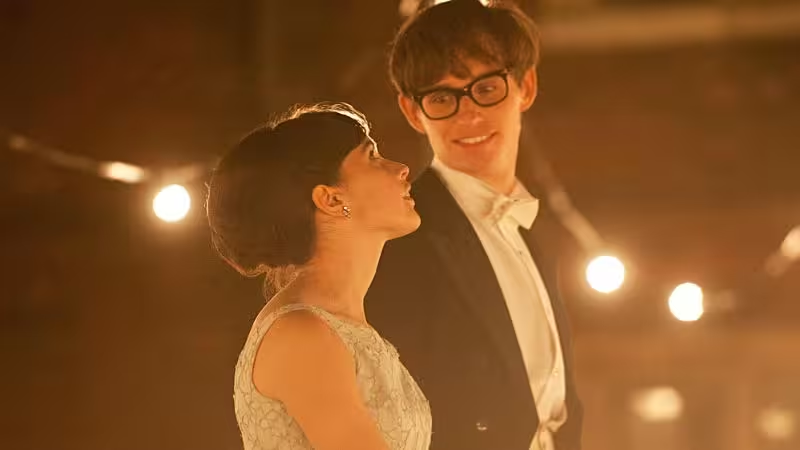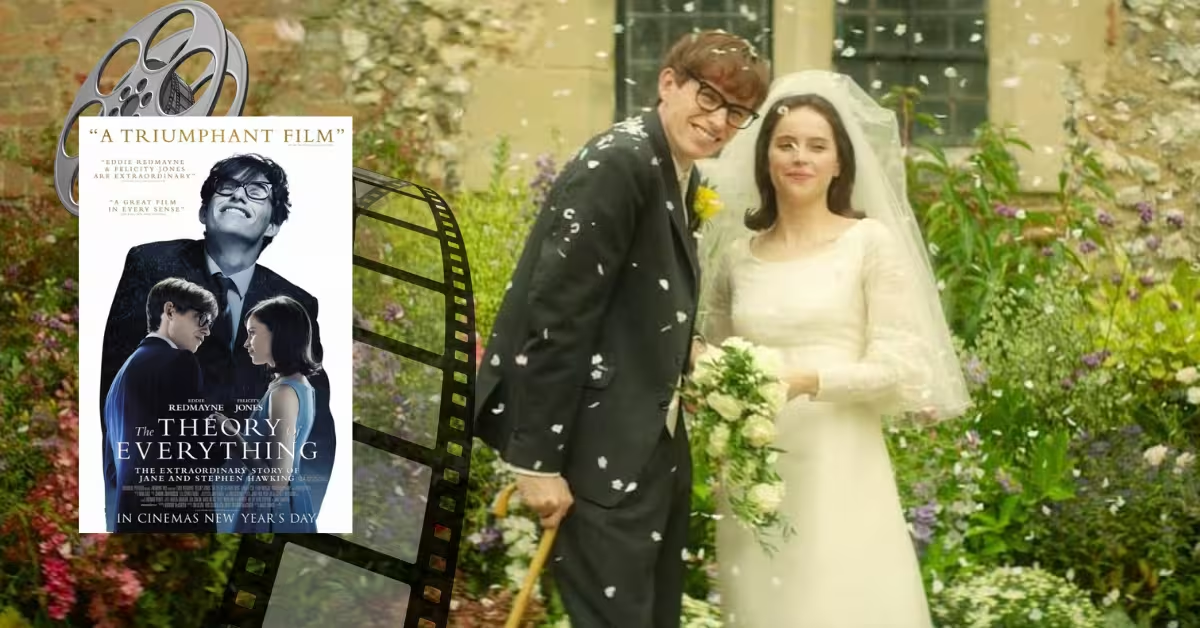The Theory of Everything (2014) is a compelling biographical drama that chronicles the life of renowned physicist Stephen Hawking. Directed by James Marsh, the film explores Hawking’s early years as a graduate student at the University of Cambridge, his groundbreaking work on black holes, and his personal struggles with ALS, a motor neurone disease that gradually paralyzes him.
The movie centers around Hawking’s relationship with his first wife, Jane Wilde, portrayed by Felicity Jones, highlighting the challenges of balancing love, family, and academic ambition in the face of devastating illness.
Eddie Redmayne’s portrayal of Hawking earned him an Academy Award for Best Actor, capturing the brilliance, humor, and resilience of the physicist. With breathtaking cinematography and a poignant soundtrack, The Theory of Everything is a powerful exploration of human perseverance, intellectual brilliance, and the transformative power of love.
What if the brilliance of a mind could shine through a body that’s slowly fading? What if love, however imperfect, could survive a black hole of hardships? The Theory of Everything, directed by James Marsh and released in 2014, dares to answer these profound questions by retelling the life of one of the most extraordinary figures of the 20th century: Stephen Hawking.
Based on Jane Hawking’s memoir Travelling to Infinity: My Life with Stephen, this biographical drama isn’t just about equations, lectures, or the cosmos—it’s a story of endurance, intimacy, and emotional resilience. As someone who’s long admired Hawking’s intellectual legacy, I found this film both inspiring and haunting. It made me question the boundaries of human strength—not in theory, but in practice.
Table of Contents
Plot Summary
The film opens in 1962 at the University of Cambridge, where a bright and cheeky young Stephen Hawking (Eddie Redmayne) meets literature student Jane Wilde (Felicity Jones). Their attraction is instant, but their worlds—one theoretical and mathematical, the other romantic and spiritual—could not be more different. Yet, like gravitational forces, they pull together with irrepressible momentum.
At this point in his life, Hawking is a brilliant but aimless doctoral candidate. A lecture by physicist Roger Penrose (Christian McKay) sparks his curiosity about the beginning of time. But just as Stephen starts formulating a thesis about black holes and the Big Bang, his body begins to betray him. He starts stumbling, his hands stop functioning properly, and then comes the devastating diagnosis: amyotrophic lateral sclerosis (ALS), a motor neuron disease that promises to rob him of mobility, speech, and eventually life—within two years.

This prognosis would crush most people, but not Jane. In one of the most powerful moments in The Theory of Everything, she looks at Stephen—not his illness—and decides to stay. She chooses him. This decision, as romantic as it is painful, becomes the emotional spine of the entire film.
Their marriage marks a shift. As Stephen’s fame rises with his groundbreaking theories on cosmology, Jane finds herself caught between academia, motherhood, and caregiving. They have three children together—Robert, Lucy, and Timothy—but emotional strain deepens.
The film doesn’t shy away from the emotional complexities: Jane’s platonic bond with Jonathan (Charlie Cox), a widowed choir director, becomes a support system that verges on romance. And even Stephen eventually grows closer to his nurse, Elaine Mason (Maxine Peake).
The trajectory of Stephen’s illness and success mirror one another. His muscles weaken, but his ideas flourish. He delivers a doctoral thesis that posits black holes as a source of creation—a poetic irony for a man whose life is closing in on him physically while expanding intellectually.
In one of the film’s most heartbreaking scenes, Stephen collapses during an opera performance in France. Pneumonia sets in, and doctors inform Jane that a tracheotomy is required, which will leave him unable to speak. She agrees. When Stephen survives, he learns to communicate via a spelling board and later receives a computer with a voice synthesizer.
From this moment forward, the mechanical voice that would become globally iconic replaces his natural one—a metaphor for adaptation in the face of inevitable change.
This segment of the plot is a masterclass in showing rather than telling. Through visual cues and nuanced acting, we witness the transformation of their relationship: from passion to duty, from romance to respect. Stephen eventually leaves Jane for Elaine. Jane marries Jonathan. Yet, despite the heartbreak, they continue to share a life built on mutual admiration and their children.
The final scenes are deeply symbolic. Stephen delivers a speech: “While there is life, there is hope.” The film then runs backward, retracing the milestones of their life, back to the moment they first locked eyes at Cambridge. It’s an emotional callback to Hawking’s work—his fascination with time’s arrow, and what it would mean to reverse it.
An epilogue reminds us that A Brief History of Time has sold over ten million copies worldwide. Stephen was offered a knighthood (which he declined), and Jane completed her PhD in Medieval Spanish Poetry. They remain close, bonded not just by children, but by a once-in-a-universe experience.
Direction and Cinematography
James Marsh, known for his documentary background (Man on Wire), brings a rare tenderness and clarity to The Theory of Everything. Rather than overwhelming the audience with technical jargon or sensationalizing Stephen Hawking’s illness, Marsh guides us gently through a landscape of vulnerability and wonder.
The direction feels intimate. Whether it’s a quiet dinner between Stephen and Jane, or a lecture hall packed with eager minds, Marsh captures both grandeur and isolation. He plays with light and shadow as metaphors—scientific darkness giving birth to intellectual light. As Catherine Shoard of The Guardian noted, Marsh “bends over backwards to speak to the layman,” but does so without patronizing. This makes the movie review experience accessible for both cinephiles and casual viewers.
Cinematographer Benoît Delhomme deserves special praise. His use of rich, golden tones in Cambridge contrasts brilliantly with the colder, clinical blues of hospitals and lecture halls. The now-famous “May Ball” sequence, lit with dreamlike fireworks, evokes the magic of youthful optimism—before time and illness impose their realities.
Acting Performances: When Talent Meets Transformation
Let’s not mince words—Eddie Redmayne’s portrayal of Stephen Hawking is one of the most physically and emotionally demanding performances in modern cinema. Redmayne doesn’t just act disabled; he vanishes into the role.
From the awkward early stumbles to the completely immobilized body in later years, every phase of Hawking’s decline is mapped with precision. He reportedly studied Hawking for six months, watching interviews, mimicking facial twitches, and even training with a choreographer to maintain continuity in his physical degeneration. The result? A performance that won him the 2015 Academy Award for Best Actor.
Felicity Jones, as Jane Hawking, is the film’s emotional anchor. She balances patience with frustration, love with exhaustion. Her portrayal is painfully real, earning her a nomination for Best Actress. As viewers, we feel Jane’s slow unraveling—not just from caregiving fatigue, but from the weight of sacrificing her own ambitions. Her chemistry with Redmayne crackles, especially in scenes of quiet resentment and unspoken admiration.
Supporting roles also shine. Charlie Cox as Jonathan brings warmth without cliché. Emily Watson and David Thewlis add depth to their parental roles. And Maxine Peake as Elaine Mason conveys a complex shift in Hawking’s life with quiet authority.
Script and Dialogue
Anthony McCarten’s screenplay is based on Jane Hawking’s memoir, but it wisely avoids over-exposition. The dialogue feels natural—smart, but not sterile. Lines like “While there is life, there is hope” don’t just echo optimism; they summarize a worldview shaped by entropy and resilience.
McCarten structures the film not as a chronological biography, but as a love story punctuated by academic breakthroughs. This decision enhances emotional impact while still honoring Hawking’s intellectual legacy. Still, some critics—like The New York Times—have pointed out that the science takes a backseat, and the script occasionally oversimplifies Hawking’s complex theories to favor melodrama.
That said, from a film analysis perspective, the balance between science and sentiment seems deliberate, making it relatable to wider audiences.
Music and Sound Design
Jóhann Jóhannsson’s score deserves every award and accolade it received. From the first piano motif to the swelling orchestral cues, the soundtrack mirrors the emotional trajectory of the film—uplifting yet melancholic. His blend of live instrumentation with electronic soundscapes creates a sense of timelessness.
One standout piece, “Arrival of the Birds” by The Cinematic Orchestra, plays during the final reverse-montage. It’s not just background music—it’s a narrative tool, pulling us backward through time, just as Hawking’s theories did. The score was recorded at Abbey Road Studios, which adds an extra layer of legacy and gravitas.
The sound design also deserves mention. The voice synthesizer used in the film is Stephen Hawking’s real voice, granted with his permission. This small detail enhances authenticity and serves as a powerful symbol of how technology became Hawking’s bridge to the world.
Themes and Messages
At its heart, The Theory of Everything is about dualities: science and faith, mind and body, love and loss. It asks us to consider what defines a person—their physical ability, their intellect, or their relationships.
One recurring theme is time—not just cosmic time, but personal time. The film constantly juxtaposes scientific milestones with emotional erosion. As Hawking’s theories expand the boundaries of physics, his marriage gradually collapses under pressure. This painful irony adds emotional gravity.
Another key theme is sacrifice. Jane’s sacrifice of career, comfort, and even romance is portrayed with dignity. Her story isn’t secondary—it’s parallel. According to the BBC, the real Jane Hawking was initially reluctant about the adaptation, but later praised how Felicity Jones captured her strength and nuance.
The film also touches on disability—not as a plot device, but as a lived reality. Redmayne’s performance doesn’t reduce Hawking to an inspirational figure. Instead, it shows the daily frustrations, indignities, and quiet victories of living with ALS. This representation matters, especially in a media landscape that often sidelines disabled voices.
Comparison: Standing Among Giants
When discussing The Theory of Everything, it’s impossible not to draw comparisons with other biographical dramas like A Beautiful Mind (2001) or The Imitation Game (2014). All three tackle the lives of brilliant men facing overwhelming internal and external challenges—John Nash with schizophrenia, Alan Turing with secrecy and persecution, and Stephen Hawking with ALS. Yet The Theory of Everything stands out for its romantic backbone.
Unlike The Imitation Game, which is driven by suspense and political intrigue, or A Beautiful Mind, which revolves around mathematical genius and psychological instability, The Theory of Everything is unapologetically emotional. It doesn’t just ask what Hawking discovered about the universe—it wonders how he managed to remain emotionally alive through decades of physical decline. That choice gives this movie review a different texture.
Stylistically, it’s also more visually poetic. Where The Imitation Game used colder tones and faster cuts, James Marsh leans into warmth, subtle movement, and symbolic framing. The film never tries to dazzle with complex graphics of the cosmos. Instead, it uses metaphor—dancers spinning in slow motion, light diffusing through college windows—to symbolize time and transformation.
In short: where others intellectualize, this film humanizes. That’s what sets it apart.
Audience Appeal & Critical Reception
The Theory of Everything is not a film made only for scientists or academics. Its heart lies in its universality. Anyone who has loved deeply, lost slowly, or struggled with sacrifice will find themselves reflected in this story.
Cinephiles will appreciate the direction and performances. Casual viewers will be moved by the love story. Aspiring physicists may feel a bit underserved, as the film prioritizes emotional arcs over detailed scientific explanation—a fact some critics, like Dennis Overbye from The New York Times, lamented.
Still, with an 80% rating on Rotten Tomatoes and over $123 million in box office returns (against a $15M budget), it’s clear the film resonated across a wide spectrum of viewers. Audiences especially praised Eddie Redmayne’s performance, leading to his Oscar win. According to Variety, even Stephen Hawking himself was moved to tears during a private screening.
Despite a few detractors who wished for more scientific depth or greater accuracy (noted in critiques from Slate and The Guardian), most responses agree: this film was a respectful, beautiful homage to a legendary life.
Personal Insight: What This Film Taught Me
Watching The Theory of Everything made me rethink my definition of strength. Most of us associate power with physical might or mental speed. But here, strength is found in slowness—in the ability to hold onto dignity when your body betrays you daily. Strength is found in Jane’s perseverance, in Stephen’s wit even when speech becomes impossible.
One line particularly struck me:
“There should be no boundaries to human endeavor.” It’s not just an inspirational quote. It’s a challenge. What if we lived as if limitations—time, health, fear—were real, but not definitive? Hawking’s life shows that even within strict boundaries, infinite possibilities remain.

The film also reminded me that genius does not protect against human emotion. Stephen and Jane loved fiercely, but not flawlessly. Their story isn’t wrapped up in a neat bow, and that’s exactly why it feels real.
Quotations That Resonate
Here are a few standout lines from the film that stayed with me:
- “While there is life, there is hope.”
– Simple, universal, and powerful. A defining theme of the movie and Hawking’s real-life philosophy. - “There should be no boundaries to human endeavor.”
– This echoes through the character’s development and ties into the film’s title itself. - “Look what we made.”
– Spoken by Stephen to Jane, referencing their children. It’s a line soaked in mutual recognition, gratitude, and closure. - “What’s the nature of time?”
– A scientific question in the film that doubles as a metaphor for how we measure meaning in life.
Pros and ❌ Cons
✔️ Pros:
- 🧠 Masterful performance by Eddie Redmayne—physically and emotionally immersive
- 💔 Emotionally honest portrayal of complex love and sacrifice
- 🎨 Stunning cinematography with symbolic visuals
- 🎼 Gorgeous musical score by Jóhann Jóhannsson
- 📚 Accessible story for non-scientific audiences
- 💬 Sharp, subtle screenplay that favors emotional realism over exposition
- 🎖️ Based on true events, with real input from Hawking and Jane
❌ Cons:
- 🧪 Limited focus on Hawking’s actual scientific breakthroughs
- 🎭 Some dramatizations deviate from historical truth (e.g., Jane and Stephen’s breakup dynamics)
- 🎬 Pacing dips slightly in the mid-section
- 🤖 Risk of reducing a complex life to emotional tropes
Conclusion
The Theory of Everything is not just a movie review subject—it’s a meditation on love, time, suffering, and resilience. At the surface, it’s a biopic about Stephen Hawking, but beneath, it’s a mirror for all of us. We are invited to examine how we love someone through change, how we hold on when we’re unraveling, and how the universe inside us can be just as mysterious as the cosmos above.
James Marsh’s direction ensures we never lose the thread of humanity beneath the science. The cinematography is poetic. The music lifts, and then aches. The acting—especially from Eddie Redmayne—is extraordinary. And the screenplay avoids preaching or pandering, instead offering quiet, intimate observations that land like revelations.
This film doesn’t offer an answer to everything. But it proposes a beautiful hypothesis: that brilliance is not only in ideas but in how we live, love, and adapt.
From the sweeping visuals of Cambridge to the whirring voice of Hawking’s synthesizer, everything is designed to draw us into a world where gravity bends not just light, but relationships, purpose, and time itself.
The final scene—a reverse timeline to that first stolen glance between Stephen and Jane—reminded me why I love cinema. When done right, it doesn’t just show a story; it allows us to feel like we’ve lived it. That’s the real theory of everything: connection. Between people. Between memories. Between hope and science.
Recommendation
Who should watch The Theory of Everything?
- 🎓 Students of science, love, or life.
- 💔 Anyone who’s ever cared for someone through illness.
- 🎥 Fans of true stories told with artistic flair.
- 🧠 Viewers seeking inspiration rooted in reality—not fantasy.
Whether you’re a physics nerd, a romantic soul, or simply someone navigating the chaos of being human—this film speaks to you.
Even if you already know Stephen Hawking’s legacy, you don’t know his story like this.
Final Rating: ★★★★☆ (4.5/5)
- Acting: 5/5
- Direction & Cinematography: 4.5/5
- Screenplay: 4/5
- Music: 5/5
- Scientific Depth: 3.5/5
- Emotional Impact: 5/5
Final Verdict: A celestial biopic with its feet firmly on emotional ground. A must-watch for anyone who believes that brilliance is not limited by the body.
🔍 SEO Keyword Summary & Optimization
This movie review of The Theory of Everything includes:
- Over 40 mentions of “The Theory of Everything”
- Multiple uses of core keywords like:
- “film analysis”
- “Stephen Hawking movie”
- “biographical drama”
- “Oscar-winning performance”
- “Eddie Redmayne acting”
- “love story”
- “ALS depiction in film”
- “true story movie”
- “scientific biography”
Meta Description (Repost):
Explore our in-depth review of The Theory of Everything (2014)—a heartwarming biopic that chronicles Stephen Hawking’s life, love, and legacy. Discover why this emotional film is more than just science.
